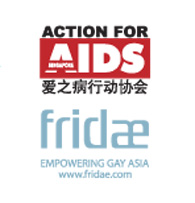The following is a press statement issued by Fridae and Action for AIDS (Singapore) on Dec 1:
Action for AIDS Singapore and Fridae.com, a leading Asian LGBT networking website, will host the first Developed Asia Regional Consultation on HIV in MSM (men who have sex with men) and transgender people (TG) in Singapore.

Seventy delegates including health sector officials, researchers/academics, United Nations officials and community representatives representing 40 organisations in Hong Kong/Macau, Japan, Singapore, South Korea, Taiwan, Malaysia, Thailand and China will attend the conference. Over the 2 days delegates are expected to formalise the creation of a network of organisations advocating for HIV prevention and treatment services for MSM and TG in developed Asian countries.
"This is a landmark event for the region. There is currently no dedicated information and discussion platform that joins communities and researchers in developed Asian countries and territories. Developed Asian countries have similar HIV epidemics, especially in MSM communities. These communities share common challenges that have led to increasing HIV infections, and have similar ethnic and cultural backgrounds. Programmes targeting MSM communities are still under-resourced," said Professor Roy Chan, President of Action for AIDS and co-organiser of the conference.
Prevalence of HIV among MSM and TG is on the rise in most developed Asian countries, with rates soaring significantly higher than that of the general population as is the case in Korea (55 times), Japan (44 times) and Taiwan (210 times, 2004 figures). In China MSM HIV prevalence is 88-times higher than the national rate.
However of the six countries and territories in Developed Asia, only Japan, Singapore, and Hong Kong have included MSM/TGs in their national strategic plans. While Japan has a program for MSM/TG, the program does not have an allocated budget, according to the October 2010 Asia Pacific Coalition for Male Sexual Health (APCOM) report.
"Communities in these countries suffer from insufficient funding from their national governments for HIV programs targeting MSM and TG,” said Laurindo Garcia, HIV Program Manager of Fridae. “They are also ineligible for international technical assistance from agencies such as UNAIDS or UNDP because of their country's ‘developed’ status. This situation contributes to an inability to respond adequately, or scale-up programmes effectively. Insufficient investment in prevention programs leads directly to the increased infection rates that we are now observing. We hope this consultation will begin to address these challenges through better regional cooperation."
In 2008, the Commission on AIDS in Asia warned that in Asia, a new wave of infections is imminent particularly among vulnerable groups, and that by 2020, 50% of new infections would come from the MSM/TG population. (http://data.unaids.org, pp 77-79). “The lack of government support and political leadership in the provision of HIV/AIDS services for MSM/TGs manifests and discrimination at the level of policies and mainstream public health infrastructure,” the report read.
Acceptance of gay, bisexual men and transgender people in society remains a sensitive issue in many developed Asian countries. Prevailing social norms make it difficult for the needs of these sexual minorities to be thoroughly discussed in parliamentary discussion and the public domain. These same norms pose a barrier for the community to speak out and advocate for better services. Criminalisation of male-to-male sex – as is the case in Singapore and Malaysia – impedes promotion of safer sex campaigns. Harassment and other punitive law enforcement practices in other countries also inhibit effective outreach programs.
This consultation seeks to improve cooperation between countries with the view that increased collaboration will result in more effective prevention programs and improved quality of treatment and support for MSN and TG. An action plan and series of recommendations will be drafted, with advocating for increased research, community involvement and specific programs that are sensitive to the needs of vulnerable groups such as young people and people already living with HIV.

